By: Morgan Clark-Gaynor
Drea and I hopped onto a zoom meeting, the world’s new comfort zone, for our interview. Both of us chose to sit outside in the newly sunny Portland springtime. Drea told me to pipe up if it was too windy to hear her, and I assured her that our connection was clear. Drea shared with me that she was going through some COVID stress; someone she had spent outdoor time with had developed symptoms. In a rhythm that is all too familiar, I offered her my sympathy. We processed briefly, and then we laughed in the face of chaos. Winding our way back to the interview, I asked if she was ready to get started. She said “Yeah, let’s do it.”
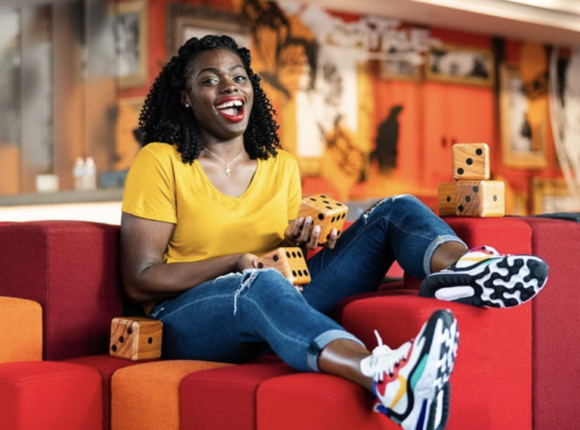
Andrea Vernae (Drea to her friends) is both a resident artist at the CoHo Lab, and the financial associate at the theater. Additionally, Drea is the Audience Services Manager at Portland Playhouse, making her a full-time artist and creative mastermind. In our truly delightful conversation, she reflected on her relationship to performance and the process she has undergone to develop her latest work. The interview that emerged revealed how S.O.M.A. Story Of My Anxiety, is a hero’s journey through fear itself.
“Truthful, authentic, and free.”
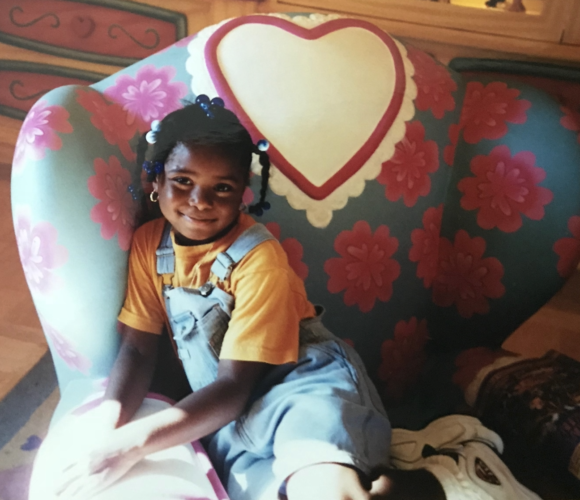
To begin, I asked Drea about her artist lineage. She was confident, peaceful, and deeply thoughtful as she considered the origin story of her craft. After a short ponder, she told me that her relationship to theater sprouted from a love of storytelling, “I think that’s why I got into theater in the first place. I love stories, I love telling stories.” Her connection to storytelling stretches back to her childhood. She told me about how her dad and grandmother were captivating yarn spinners. They would tell her stories about her great grandfather, a man she never knew, but felt like she had, due to the stories’ vividness and clarity. Drea happily learned the family trade, developing her own style for telling tales. Laughing and reminiscing, she said, “I would hold space for hours just telling them about my day. And I would embellish a little bit, you know, but I knew how to do that in 4th grade.” To Drea, stories are how she learns and understands the world around her, and theater is how she harnesses that power.
As Drea developed her storytelling style, she found her identity as an artist and created a career in its image. I asked her to describe her artistic aesthetic (that which connects all of her work into a personal style), and once again she turned inward to seriously consider the question. After a moment, she emerged and happily said the following words:
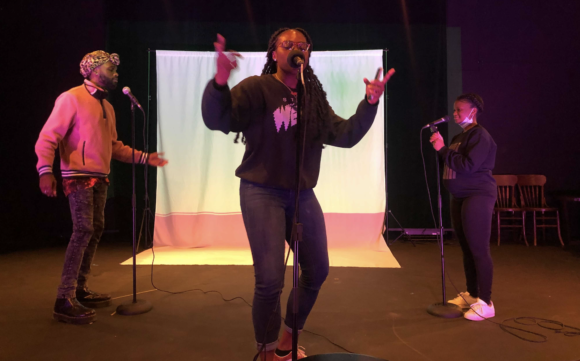
Minimal
Rhythm
Eclectic
Musical
Joy
Black
Truthful
Authentic
Free
“Shout out to my therapist.”
Moving right along her artistic timeline, I asked what influences and disciplines have impacted her process most. With her trademark thoughtfulness and care, Drea began with dance. “I love dance, I’ve always loved dance. I always say in a former life, that’s just who I was. There’s not a lot of technical dance in this piece but it plays with movement and how it flows, then we apply that movement to words and music.” S.O.M.A. offered Drea an opportunity to lead with her musical foot, something she hasn’t done before. In partnership with music, Drea’s relied heavily on herself to develop her work. “I have been so introspective in quarantine. I have done a lot of work on myself in this past year.” Cheekily, she laughed, “So yeah, my therapist, shout out to her. She was a major influence.”
The COVID-19 pandemic forced Drea to really sit with herself for the first time in a long time. She admitted that she has codependent tendencies and there were portions of the pandemic where she would call people to avoid being alone with herself. Over time, she developed a skill set for being alone, and from there she discovered her resilient sense of confidence, “I realized that I’m a dope person and when I trust myself, I can create amazing things.” Emboldened by self-reliance, Drea still has fears about being alone, but she is also able to access her authenticity and appreciation for who she is and what she has. S.O.M.A. is the product of this transformation. “There’s something about being left alone with your thoughts that takes you on this epic journey.”
S.O.M.A. was originally going to be about Drea’s brother and the ways their family processed his mental illness. However, when the time came to create this piece, Drea didn’t want to take things in this direction. “It felt sad and heavy, and with all the other shit that’s already going on, we don’t need to see that. I don’t feel like writing that.” So she put off the project until one day she was scrolling through Instagram and found her inspiration. Laughing, she said “This picture came up of all the symptoms of anxiety. And I was like ‘That’s it! I’m gonna write about my anxiety!’ So sometimes scrolling on Instagram to distract yourself is productive.” From there, she got to work and was soon writing S.O.M.A.’s first song.
“You can’t run from the story.”

When I asked why Drea had chosen to develop S.O.M.A. in the CoHo Lab, she told me that it was about the space. “I’ve always loved CoHo’s space, it forces you to pay attention. I love black box spaces, they’re so intimate, you can’t run from the story in there. You’re forced to just sit with whatever story is being told, and that’s effective.” She is inspired by the possibilities presented by such close quarters, seeing the infinite possibilities in the limitations. And now, with CoHo’s cameras, there are even more opportunities for exploration. In a similar style to her emotional reckoning in quarantine, Drea loves the CoHo space because it gives her the container she needs to confront vastness.
“The lyrics came in pieces.”
Like so many great projects do, S.O.M.A. began on post-it notes. Drea had a set of large post-its, which she used to line her bedroom walls with ideas. She had a post-it for set design, one for general concepts, one for inspirational music (one just for favorite Tiny Desk performances), one for lyrics that felt resonant, and one for people she would love to work with. Jumping off from there, she decided to learn how to play the keyboard. Giggling, she said, “I was like clunkin’ out different chords, and so yeah, lots of late nights.” From inside her rabbit hole, she finally found lyrics. “The lyrics came in pieces, so I would just write them down as they came not even knowing what the song would be, but just knowing that it would be incorporated someway- or not.” She started to tie these pieces together, trusting her gut to find their shape down the road.
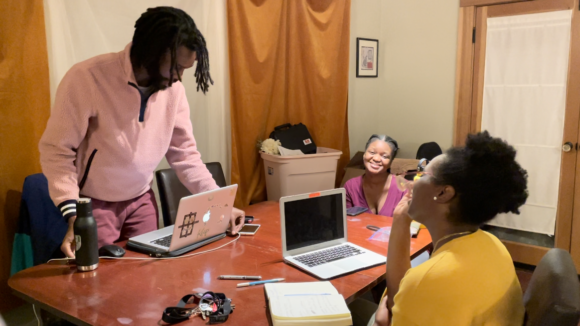
Alongside her gut, Drea’s artistic and emotional support team helped to shape the show. At one point, her therapist told her “You don’t trust your body, you stay in your head.” Drea played with different ways to sing that, singing it over and over again and eventually turning that therapeutic insight into her first song. She then built her creative team, including her roommate and producer Jaylin, and a singer and friend named Netty. Drea chose her mentor, Kisha Jarett, and was quickly assigned the task of crafting an artist statement. From there, the project snowballed. Rehearsals picked up, Drea learned how to write songs and arrange vocals, and the team started to produce beats. They have now produced five songs, all currently being mixed and mastered. With all the joyous glee in the world, Drea exclaimed, “Oh, I have five songs, Morgan! I have five songs! With lyrics!” The team is now in the process of plotting the scenic visuals to accompany their music, an exciting and difficult final step in S.O.M.A.’s evolution.
“It’s like the first time you realize that you’re allergic to pineapple.”
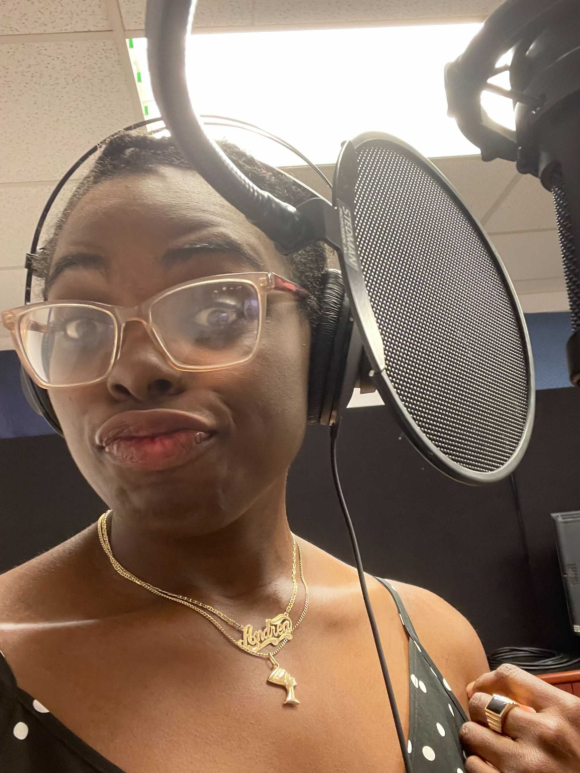
I asked Drea what this project means to her. Once again, she gave gracious spaciousness to our back and forth as she deliberated her response. After a beautiful pause for introspection, she said “It’s evolving. My anxiety has evolved. It doesn’t show up like it used to anymore. And I’m evolving too, and that’s not always easy to accept because I don’t like change. So that’s made me be more receptive to change and that change isn’t necessarily always bad.” This lesson translated into her process, where she was confronted with original music that she didn’t like at times. Drea chose to stick with the songs that weren’t working in order to change them for the better. This process opened her up to change itself, conceptually and practically, influencing her relationship to anxiety. “My anxiety hasn’t gone away, but it’s evolved and it presents itself in new ways. Before I used to get a lot of panic attacks, and now I don’t, I just get crazy overwhelmed to the point that I don’t wanna do anything- and that’s new.” S.O.M.A. is both an expression and evolution of Drea’s inner world; it simultaneously reveals her history with fear while also giving her the tools to approach it differently.
Bouncing off of this dialectic discovery, I asked Drea how she would synopsize her piece as it stands now. She considered this for a long time, taking my question very seriously. “So many things” she said, “…so many things.” Laughing, she surfaced from her reflection and said in the most self-assured way, “S.O.M.A. is the journey from Mind, Heart, to Spirit.” All I could do was sit in total amazement at her clarity.
Excited by her rigorous consideration, I pressed on and asked how Drea would describe her project with sensory language. She got a real kick out of that question, and laughed as she tumbled into the absolute best artistic statement I’ve ever heard:

“S.O.M.A. is like, you go to Hawaii for the very first time and you’re sitting on the beach, you feel the breeze, feel the sun. You get your drink in a pineapple and… this is the first time you realize that you’re allergic to pineapple, and you have an allergic reaction. You take benadryl, then you just tell your mind that it’s fine and your mind is like ‘Oh, okay. I’m fine.’
That’s what it was when I went to Hawaii. I was like, ‘I don’t know if I’m still allergic to this.’ I have a lot of food allergies, you can outgrow some of your food allergies but if you don’t get tested, you just spend your entire life convincing yourself that you’re allergic to this thing. So I would get a Pina Colada, and I’d be like, ‘No pineapple.’ But then I’d be like ‘Damn. What if they didn’t take the pineapple out? I mean, shit, that’s what a Pina Colada is! It has it in there! What even is it without it?!’ Just the anxiety of making yourself feel like you’re having an allergic reaction and then you’re just like ‘pff, I’m fine.’
“I’m doing what I want and I’m having fun doing it.”
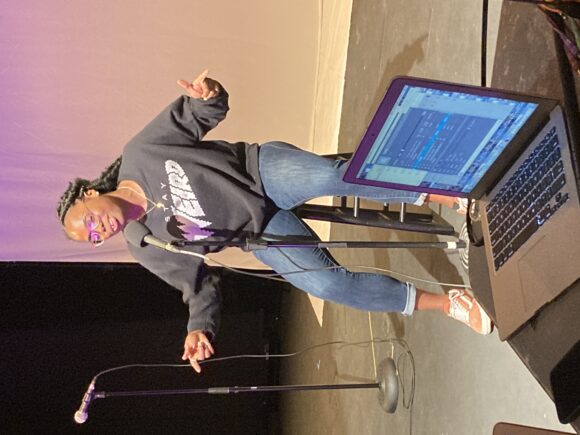
I had the chance to catch Drea’s private preview of S.O.M.A. last week, and it was a genuine blast. She is doing exactly what she wants and having fun doing it. Join Drea as she probes her own mind on the quest to conquer fear. Tickets to SO.M.A. are available now. All tickets are Pay-What-You-Can, so find a price point that feels right and reserve your virtual seat to this brand new show. Drea recommends that you listen to it on headphones, or turned up nice and loud on a speaker.
Thank you for tuning into Andrea Vernae’s creative process. Join us next week when I sit down with Chris Gonzales to dissect his latest work in the CoHo Lab. As always, thank you for reading and supporting these phenomenal local creatives. We could not be more inspired and excited to amplify their generous, full-hearted work for the larger Portland community.
Morgan Clark-Gaynor
Theatre Maker
Improviser and Deviser
Operations Assistant with Coho Productions




